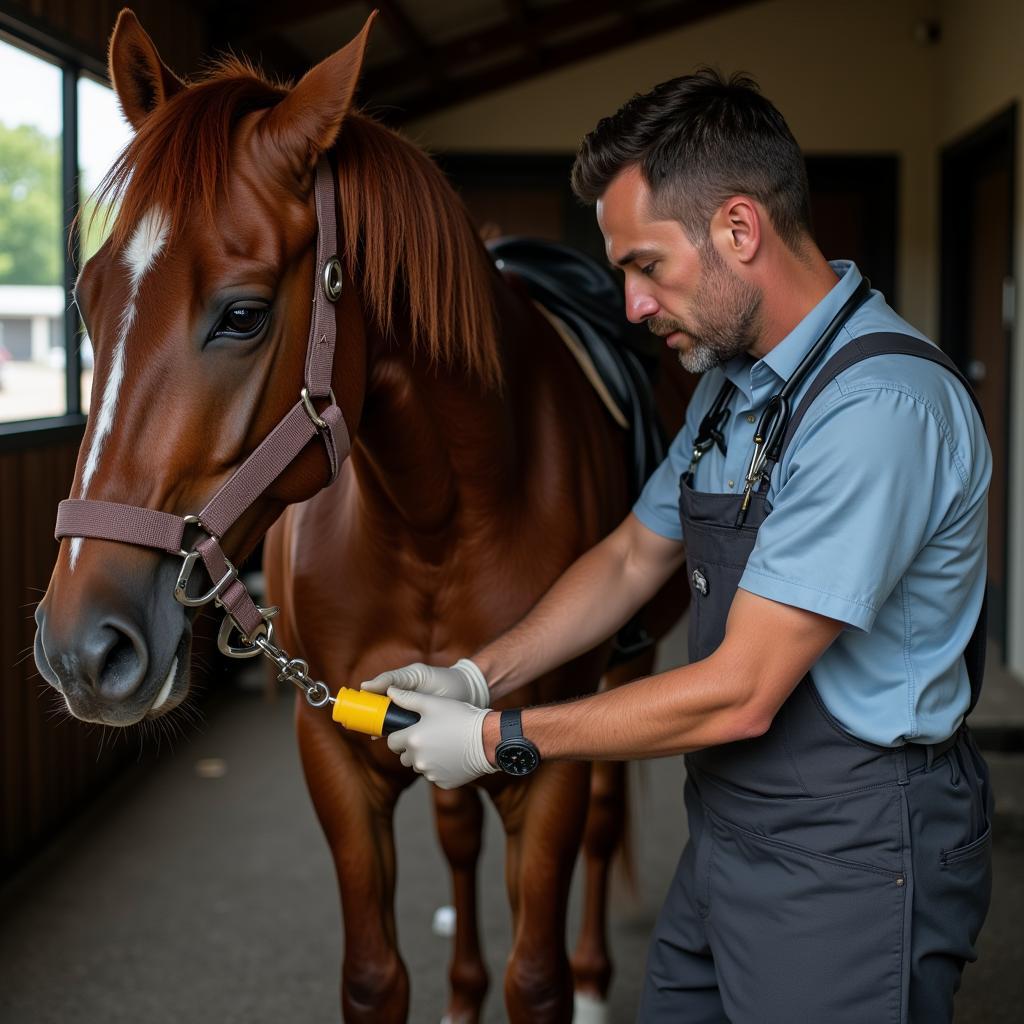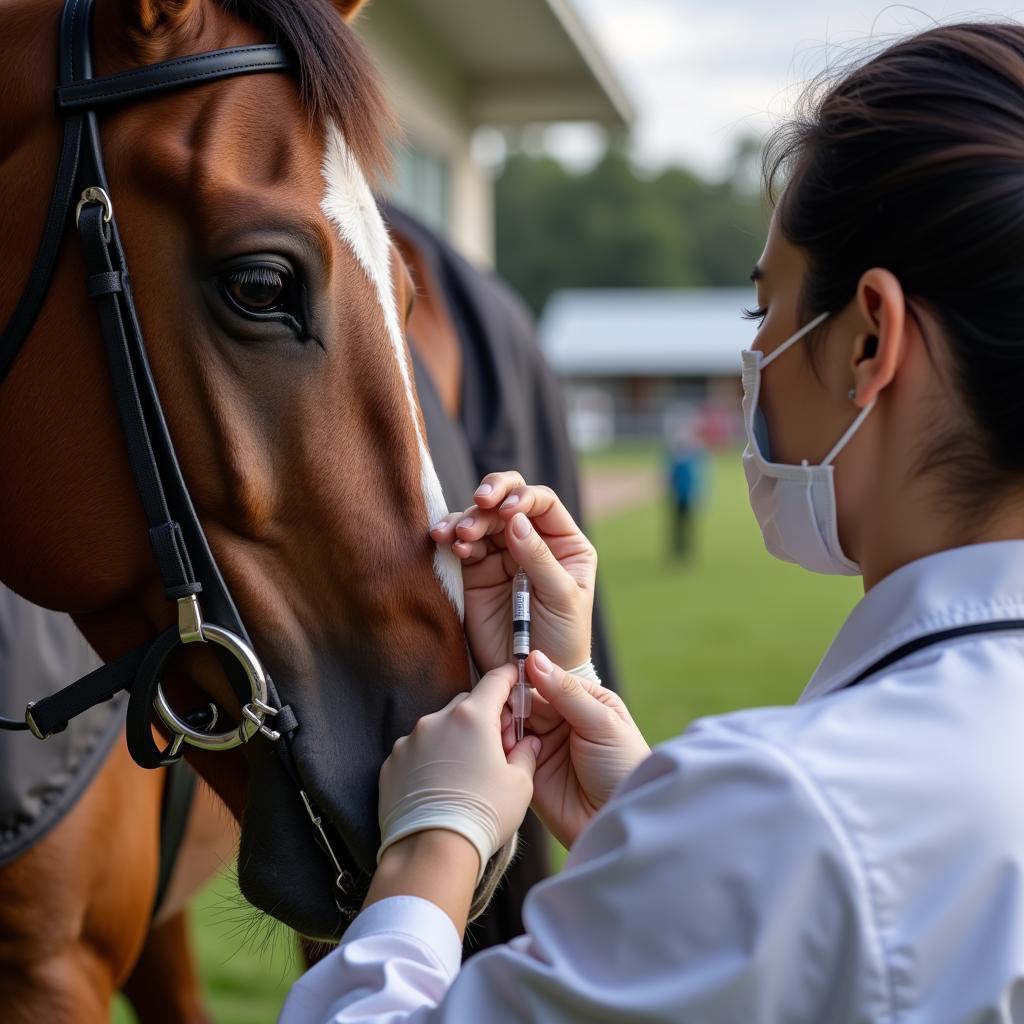Race Horse Medicine is a critical aspect of equine athletic performance and overall well-being. Maintaining a horse’s health requires a comprehensive understanding of medications, treatments, and preventative care specific to the demands of racing. This article delves into the intricacies of race horse medicine, covering everything from common ailments and their treatments to the importance of preventative care and ethical considerations.
 Veterinarian examining a race horse
Veterinarian examining a race horse
Understanding the Demands of Racing on Equine Health
The rigorous training and competition inherent in horse racing place significant stress on the equine body. Understanding these demands is crucial for developing effective medical strategies. From high-intensity sprints to long-distance races, different disciplines require tailored approaches to medication and care. For example, a sprinter may be more susceptible to muscle strains, while a distance runner may experience respiratory issues. Recognizing these breed and discipline-specific vulnerabilities is essential for preventative care. Did you know certain breeds are predisposed to specific conditions? This makes understanding lineage and medical history crucial.
Common Ailments and Treatments in Race Horses
Racehorses, like any athlete, are prone to certain injuries and illnesses. These can range from minor issues like cuts and abrasions to more serious problems like fractures and respiratory infections. Effective treatment requires prompt diagnosis and appropriate medical intervention. Here are some common ailments:
- Lameness: This is a broad term encompassing various leg and hoof problems, often requiring diagnostic imaging like X-rays or ultrasounds.
- Respiratory Infections: These can significantly impact performance and require careful monitoring and treatment with antibiotics or other medications.
- Gastric Ulcers: The stress of training and racing can contribute to the development of ulcers, often requiring dietary changes and medication.
What are the most effective treatments for these ailments? This often depends on the specific diagnosis and severity of the condition. Consultations with experienced equine veterinarians are crucial for developing personalized treatment plans. You can find english horses for sale that have been properly cared for and have a detailed medical history.
Preventative Care: The Cornerstone of Race Horse Medicine
Preventing illness and injury is paramount in race horse medicine. A comprehensive preventative care program includes:
- Regular Veterinary Checkups: Routine examinations allow veterinarians to detect potential problems early and implement preventative measures.
- Vaccinations: Protecting horses from infectious diseases is critical for maintaining their health and preventing outbreaks.
- Dental Care: Regular dental checkups and floating ensure proper chewing and digestion, which are vital for optimal performance.
- Farrier Services: Maintaining healthy hooves is essential for preventing lameness and ensuring soundness.
- Nutritional Management: Providing a balanced and appropriate diet is fundamental to overall health and performance. Choosing the right dark horse seeds for optimal nutrition can be a key factor.
“Preventative care is not just about avoiding illness,” says Dr. Emily Carter, DVM, “it’s about optimizing health and maximizing performance. It’s the foundation of a successful racing career.” This proactive approach can save time, money, and most importantly, protect the well-being of these magnificent animals.
 Veterinarian administering a vaccine to a racehorse
Veterinarian administering a vaccine to a racehorse
Ethical Considerations in Race Horse Medicine
The use of medication in racehorses is a topic of ongoing debate. Balancing performance enhancement with animal welfare is a critical ethical consideration. Regulations and guidelines vary between jurisdictions, and it’s essential to stay informed about the latest rules and best practices. Transparent communication between trainers, veterinarians, and racing authorities is crucial for maintaining the integrity of the sport and ensuring the ethical treatment of these athletes.
“Transparency and open communication are essential for upholding the highest ethical standards in horse racing,” says John Miller, a renowned horse trainer. This not only protects the horses but also maintains the integrity of the sport. Knowing a horse’s history and understanding the training methods of trainers like todd fincher horse trainer can provide valuable insights.
Conclusion
Race horse medicine is a complex and ever-evolving field. From understanding the specific demands of racing on equine health to implementing comprehensive preventative care programs and navigating ethical considerations, a holistic approach is essential for ensuring the well-being and maximizing the performance of these incredible athletes. Understanding race horse medicine allows owners and trainers to make informed decisions that prioritize the horse’s health and longevity. Remember that proper grooming practices, like knowing how to blanket clip horse, also contribute to their overall well-being.
FAQ
- What are the most common injuries in racehorses?
- How often should a racehorse receive a veterinary checkup?
- What are the key components of a preventative care program for racehorses?
- What are the ethical considerations surrounding medication use in racehorses?
- How can I find a qualified equine veterinarian specializing in racehorse medicine?
- What are the signs of a respiratory infection in a horse?
- What should I feed my racehorse for optimal performance?
Looking for more fun with horses? Check out these horse names for night at the races.
Need help with your horse’s health? Contact us! Phone: 0772127271, Email: [email protected] or visit us at QGM2+WX2, Vị Trung, Vị Thuỷ, Hậu Giang, Việt Nam. Our customer service team is available 24/7.